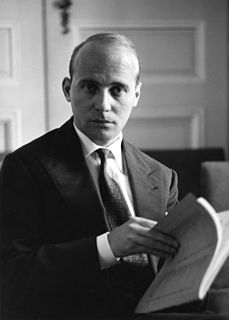Stefan Hakenberg is a composer. He was born in Wuppertal, Germany, and currently lives in Juneau, Alaska. Reviewers have praised his music as "highly original," "dramatic and memorable," "creating strong musical expressions in a densely contrapuntal style." The integration of players of non-western classical background has particularly shaped Hakenberg's creative thought. His work is an ongoing reflection on musical styles of today that he finds along an international career path that has taken him from Cologne in the 80s to Boston in the 90s to Seoul at the turn of the millennium.

Wuppertal is a city in North Rhine-Westphalia, Germany, in and around the Wupper valley, east of Düsseldorf and south of the Ruhr. With a population of approximately 350,000, it is the largest city in the Bergisches Land. Wuppertal is known for its steep slopes, its woods and parks, and its suspension railway, the Wuppertal Schwebebahn. It is the greenest city of Germany, with two-thirds green space of the total municipal area. From any part of the city, it is only a ten-minute walk to one of the public parks or woodland paths.

Germany, officially the Federal Republic of Germany, is a country in Central and Western Europe, lying between the Baltic and North Seas to the north and the Alps, Lake Constance and the High Rhine to the south. It borders Denmark to the north, Poland and the Czech Republic to the east, Austria and Switzerland to the south, France to the southwest, and Luxembourg, Belgium and the Netherlands to the west.

Alaska is a U.S. state in the northwest extremity of the United States West Coast, just across the Bering Strait from Asia. The Canadian province of British Columbia and territory of Yukon border the state to the east and southeast. Its most extreme western part is Attu Island, and it has a maritime border with Russia to the west across the Bering Strait. To the north are the Chukchi and Beaufort seas—southern parts of the Arctic Ocean. The Pacific Ocean lies to the south and southwest. It is the largest U.S. state by area and the seventh largest subnational division in the world. In addition, it is the 3rd least populous and the most sparsely populated of the 50 United States; nevertheless, it is by far the most populous territory located mostly north of the 60th parallel in North America: its population—estimated at 738,432 by the United States Census Bureau in 2015— is more than quadruple the combined populations of Northern Canada and Greenland. Approximately half of Alaska's residents live within the Anchorage metropolitan area. Alaska's economy is dominated by the fishing, natural gas, and oil industries, resources which it has in abundance. United States armed forces bases and tourism are also a significant part of the economy.
Contents
Stefan Hakenberg counts Hans Werner Henze, Bernard Rands, Mario Davidovsky and Oliver Knussen amongst his teachers. He studied at the Hochschule für Musik Köln and received his Ph.D. from Harvard University.

Hans Werner Henze was a German composer. His large oeuvre of works is extremely varied in style, having been influenced by serialism, atonality, Stravinsky, Italian music, Arabic music and jazz, as well as traditional schools of German composition. In particular, his stage works reflect "his consistent cultivation of music for the theatre throughout his life".
Bernard Rands is a British-American composer of contemporary classical music.
Mario Davidovsky is an Argentine-American composer. Born in Argentina, he emigrated in 1960 to the US, where he lives today. He is best known for his series of compositions called Synchronisms, which in live performance incorporate both acoustic instruments and electroacoustic sounds played from a tape.
Stefan Hakenberg together with his wife, kayagum player Jocelyn Clark, founded the Alaskan contemporary music organization "CrossSound," which won an ASCAP-Chamber Music America Award for Adventurous Programming, and received an NEA Creativity Grant for a program including Hakenberg's pansori "Klanott and the Land Otter People."


